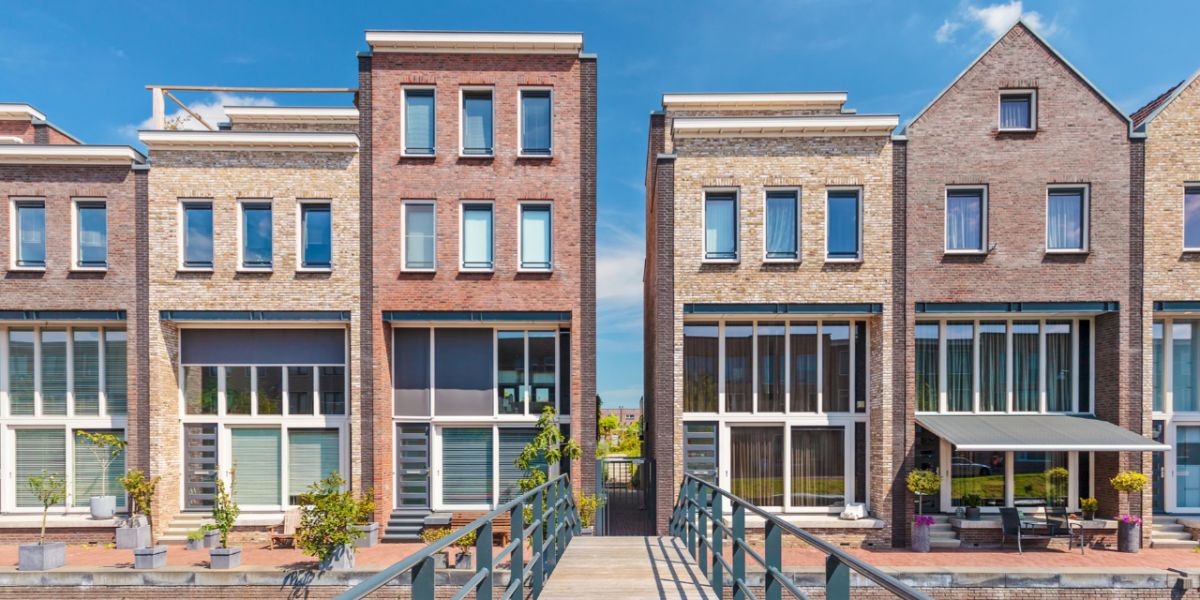
Maybe you're passing through the Netherlands for a week or so. Or maybe you're making a permanent move here. Whatever might the reason be, you may be looking for accommodations in the Netherlands. While it can be more expensive and difficult to find housing, it can be quite rewarding to stay in this country. In this article, we'll discuss the types of accommodation you'll find, plus the typical prices you can expect.
Types of accommodation in the Netherlands
In the Netherlands, there are a few types of accommodation for you to choose from. Since there's a huge shortage of accommodation, if you can't find your first choice, you should move on to alternatives to secure housing.
Below are the types of accommodation you can find in the country.
Short-term accommodation
You can get a taste of Dutch living by staying in an Airbnb. It's probably the most authentic way to see life through the eyes of a native, at least as far as accommodations go. You can rent anything from regular apartments and houses to houseboats, which can be a unique experience.
For a more mundane route, you can check your local area for short stays. These will be fully furnished apartments that may cost a little more than a normal long-term one, but they'll still be cheaper than staying in a hotel. Some come with weekly cleanings and gym access, although they're more expensive. This can buy you some time while you schedule viewings and find the perfect place.
Student housing
You can be placed on a list at your university. The sooner you get on it, the better. Typically, priority is given to freshmen, so you just might be in luck if it's your first year at university.
You should know that most student housing isn't located on campus. However, the rooms that universities get you will be quite close to campus, so it'll still be convenient to get to and from your classes.
Apartments
Apartments are the most common type of accommodation you'll find in the Netherlands. You can either rent your own or share with a roommate or two. However, the law is strict on the legal limit of tenants, so don't expect the landlord to bend the rules. They usually prefer just one tenant and won't normally rent out to more than two people for a two-bedroom apartment.
While there are normal self-contained apartments, you'll also find shared apartments where you can rent your own room, and you'll share a kitchen, bathroom, and living room with other tenants.
Houses
If you're lucky enough to find (and afford) a house, you can rent one out for either yourself or your family. If you're a student in the Netherlands, you can gather other students to live with you and split the costs. Houses that have been turned into shared accommodations are common, so it shouldn't be hard to find affordable rooms. Do note that it'll be much harder to do in Amsterdam, as laws are stricter.
For your family, you can rent a standalone house if you can afford it. Otherwise, there are terraced and semi-detached properties to look into. If you want to save on costs, you should look further from the city center, as that'll be more convenient (and pricier).
Anti-squatting (Antikraak)
You can stay in a place for dirt cheap to help companies ward off squatters. All you need to do is pay the agency a small loan fee, service costs, and sometimes, a registration fee. However, waiting lists may be as long as 15 years. Plus, you don't have as many rights as you would as a formal tenant would. And you need to keep in mind that this shouldn't be used as a long-term or permanent form of housing; it's only temporary, as the building you're living in will eventually be sold or demolished. Generally, you'll have a notice period of 14 to 28 days.
If you do manage to get anti-squatting housing, then you're responsible for keeping the building in good shape. Agencies are known to do unannounced checks to ensure you're maintaining the property. You also won't have as much flexibility in decorating the place, as it'll need to be in sellable shape. However, you may be able to make minor changes, given that you've gotten approval first.
Social vs. private housing in the Netherlands
In the Netherlands, there are social and private housing available. If you earn under a certain amount, then you're eligible for social housing. As of 2024, the threshold is €879.66 per month, which is the maximum you'd pay for rent.
Social housing comes from housing associations, which need to rent out 92.5% of their vacant properties to people who have a maximum income of €47,699 a year or €52,671 for multi-person households. They must also let another 7.5% to people with incomes higher than €47,699 (or €52,671 for multi-person households).
Rent prices in the Netherlands
When compared to other European countries, the Netherlands has very high averages when it comes to rent prices. If you want to live in Amsterdam, Rotterdam, Utrecht, or The Hague, the average price for rent is upwards of €2,000 per month for a 1-bedroom apartment that's furnished.
As the housing shortage grows, rent prices shoot up. In fact, the square meter price keeps rising every year. While prices keep rising, the exception occurred in 2021, when a decrease of expats led to a decrease in rent prices during the pandemic. To work around the general upward trend of rent prices, you should try looking outside the Randstad and try more rural places if possible. Not only is there more housing available in those areas, but rent will be cheaper as well.
The caveat to living farther out is you'll have a longer commute if you work in the Randstad. Also, it may be more difficult to fit into the community, as their social groups will be well-established and not as flexible to change. The number of people who speak fluent English will be lower as well. If you're a minority, you'll also have to factor that in. While hate crimes are low in the Netherlands, you still may face either ignorance or discrimination in some places, especially in smaller villages.
Lease conditions and procedures in the Netherlands
You can find listings on Funda, DirectWonen, and Pararius. You can directly contact or check the lists of real estate agencies, such as REMAX. In fact, you can leave your details with the agents and they'll alert you if any properties come up that meet your criteria.
When you're going through the renting process, make sure you always visit the property in person. Since people are desperate for housing, there are many people running scams who take thousands in Euros as payment, then disappear. Most often, they'll pick a random address and claim it's their property. If you must rent a property while still overseas, you should always look up the address on Google Maps to verify. Have other people check the address for you (friends, family, or even volunteers from online forums) to make sure it's an existing building and it's indeed up for rent.
You should also make sure you can register at the property. If you can't, it's almost guaranteed that the landlord is renting out the property illegally.
If you're satisfied with a property and want to go ahead with renting it, then you'll have to sign a contract. Make sure you get an English version so you understand the terms completely. Many properties include things like water, electricity, gas, and internet with the rental price, so double-check those are in the contract if it was advertised as such.
After you sign the contract, you'll have to put down a deposit, which is usually one to two months' rent. You should also go through the property with the landlord so you can extensively document any existing damage. Otherwise, they'll try to charge you for it when you move out.
Some apartments are cheaper because they're a “shell” apartment. This is a bare property; even more so than an unfurnished apartment. It won't have furniture or appliances, nor will it have flooring. You'll be expected to purchase everything on your own. You can either take everything away with you after you move out or you can try and sell it to the next tenant. If you're planning on staying in the Netherlands long-term, then renting a shell apartment can be highly cost-effective. The things you buy for the apartment can furnish your property if you buy one later on.
Tenancy laws in the Netherlands
Do note that the Netherlands is a country where oral agreements are valid, so be careful about what you say, as landlords can hold you to it. However, as of 1 July 2023, landlords must only use written tenancy agreements, not oral ones.
Prior to 1 July 2024, you had the choice of a fixed-period or indefinite tenancy. However, as of this date, landlords can only offer you a permanent rental contract. There are a few exceptions to this. For example, if you're a student and you're renting outside of the city you're studying in, you can get a fixed-term contract (maximum of 2 years). Or if you come from a social shelter, you can get one too. The Rijksoverheid has more information about fixed-term contracts (in Dutch). Do note that if you get a fixed-term contract, there are still some conditions in which it can be terminated. Make sure you understand those conditions to avoid any future surprises.
If you're renting in the private sector, then you should know that landlords are limited by the law as to how much they can raise the rent by. For example, until 1 May 2029, landlords can only increase the rent once a year at a rate of inflation plus 1%. Or they can raise it once a year at the rate of wage development plus 1% when the wage development is lower the inflation. For 2024, this meant the maximum they could raise the rent by was 5.5% since inflation was set at 4.5%. If you ever feel like your landlord has raised the rent too much, you can dispute it with the Rent Tribunal (Huurcommissie). The Rent Tribunal is also there in case you can't resolve a dispute with your landlord. It'll cost you €25 to get their help.
In other countries, you might be used to having the landlord take care of all maintenance for the property. However, the Netherlands is different; the tenant is responsible for minor repairs. The exception is if the minor repair is expensive; in that case, the landlord should pay for it.
How to buy property in the Netherlands?
The good news is you don't have to be a resident to buy property in the Netherlands, which means there are no residency requirements to fulfill. However, if you want to get a Dutch mortgage, you'll have to prove you've lived and worked in the Netherlands; the longer, the better for entrepreneurs. Otherwise, a permanent contract at a company will do too. Do note, however, that this process may be more difficult for you if you're a non-EU citizen.
If you're successful in getting a mortgage, or if you don't need one, you'll need to then establish a sales contract (koopakte) and get a notary. They'll prepare your deed documents (leveringsakte) and mortgage (hypotheekakte) for your bank loan if needed.
You should know that the market for property purchases is just as hot as rental ones, if not hotter. Everyone's trying to avoid paying high rent, as mortgage payments are usually lower. But while homebuyers enjoyed historically low mortgage rates just a few years ago (around 1%), these days (in 2024), they're over 3%, with a typical 30-year period having an interest rate of between 4.4% to almost 5%. While this might be enough for you to hold off on making a purchase, in most cases, it's better to buy now than later. The country can't keep up with housing demands, so the prices are probably only going to get higher as time goes on.
If you'd like to buy property in the Netherlands, then consider working with a mortgage advisor that specializes in expat clients. It can make the whole process a lot easier.
We do our best to provide accurate and up to date information. However, if you have noticed any inaccuracies in this article, please let us know in the comments section below.








